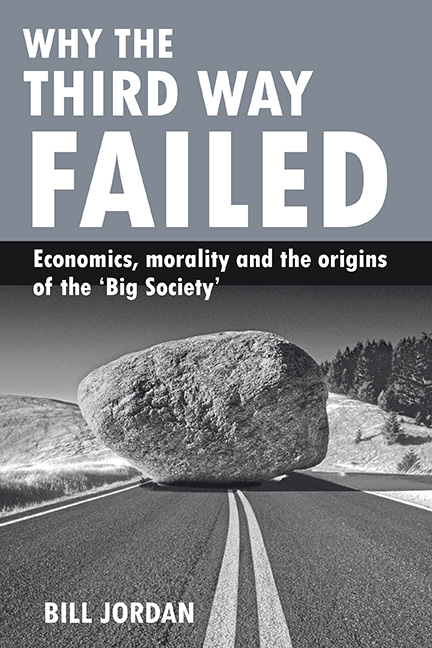eight - Sustaining quality of life
Published online by Cambridge University Press: 01 September 2022
Summary
At the start of a new century, two issues have challenged public policy, and especially the economic model on which government had come to be based after the momentous geo-political events of 1989. The first was the failure of self-assessed well-being to rise in line with incomes per head in the affluent economies (Kahneman et al, 1999; Frey and Stutzer, 2002; Helliwell, 2003; van Praag and Ferrer-i-Carbonell, 2004; Layard, 2005; Jordan, 2008).
The second was the evidence of accelerated global warming, and the requirement for coordinated action to reduce carbon emissions. Neither of these newly recognised phenomena was susceptible to the policy approaches adopted by the Third Way. The economic crash of 2008-09 signalled the Third Way's failure, even on its own terms, but it also supplied an opportunity to reconsider policy responses to these other two challenges in the light of a new situation.
Ideally, what might emerge from the crash is a realignment of economic activity, in which the moral demands of an ecologically sustainable form of development are reconciled with a set of social relations more conducive for the well-being of populations. The former requirement involves changes in production and consumption, as well as in the use of resources such as fossil fuels; the latter demands that more attention is paid to the creation and exchange of social value in economic as well as recreational and cultural interactions (Jordan, 2008).
In this chapter I argue that these policy goals can be reconciled if a radical new approach is applied to the organisation of services, both commercial and public. Services now supply around 70 per cent of employment in advanced economies, and they comprise every aspect of economic activity, from the highly rewarded financial services to domestic and personal services such as hairdressing, social care and cleaning, which are among the lowest-paid occupations.
In principle, it would seem reasonable to suppose that this growth in services, and especially of work in education, healthcare, social and community work, should have contributed to the improvement in rates of self-assessed well-being in these societies. All of these occupational groups, and many others (such as hospitality, tourism, culture and recreation in the commercial sector) claim that their objective is to improve well-being, happiness and quality of life.
- Type
- Chapter
- Information
- Why the Third Way FailedEconomics, Morality and the Origins of the 'Big Society', pp. 171 - 190Publisher: Bristol University PressPrint publication year: 2010



